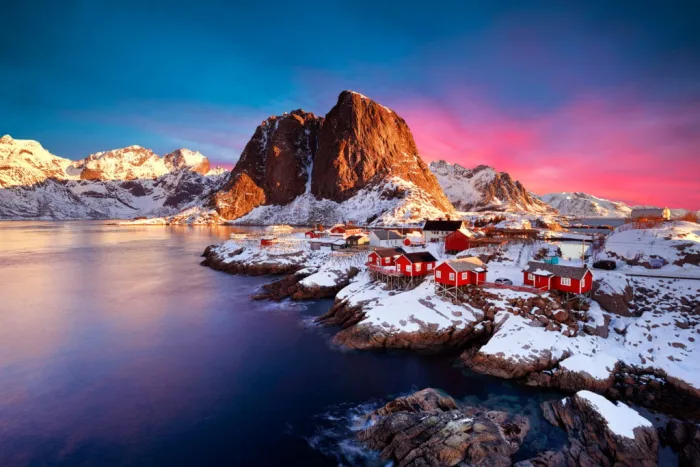coverage limitimmigrantsMost people focus on the policies, benefits and visa process, but it's when you actually get to live in the country that the challenges begin. As a country that is consistently ranked in the "Top 10 World Happiness Index", it's a good place to start.Immigration to NorwayIndeed, there is a very high level of social security and quality of lifeBut for Chinese immigrants arriving for the first time, every aspect, from climate to culture, from language to socialization, can bring "unexpected" shocks.
Today, we do not talk about data and policies, but only take you into the real life scene of an ordinary immigrant in Norway, to understand the Nordic country behind theA less glamorous, but extremely real daily experienceThe
I. Climate: What you think is "cold" is not so simple!
Many people's first impression of Norway is that it is "cold". It is true that nearly a third of the country lies within the Arctic Circle, but in fact, southern Norway and coastal cities such as Oslo and Bergen, which are affected by the warm North Atlantic Current, are also cold.Winter temperatures are not extremely cold, generally fluctuating between -5°C and 0°C.Instead, it's warmer than some cities in northern China.
However.Lack of sunlight and long wintersIt is the real problem that needs to be faced after emigration:
-
In November and February, the days are extremely short, with perhaps as few as 34 hours of sunlight, which can lead to low mood ("winter depression" is not uncommon);
-
The summer months are characterized by comfortable temperatures, butIt's still dark at 2:00 a.m.The newcomers often suffer from sleeplessness due to "circadian confusion";
-
Frequent rainy days, especially on the west coast, with upwards of 200 days of rainfall per year.It's hard to dry clothes.The
🎯 Real advice: bring vitamin D, a light therapy lamp, keep a regular routine, and don't let the weather get in the way of your good mood.
Second, socialization: under the iceberg appearance, there is actually warmth
If you're used to Chinese hospitality and the social atmosphere of "neighbors", the first few months in Norway may feel like a "social vacuum":
-
Strangers rarely initiate pleasantries, even if they are neighbors, they may have lived there for years without saying hello;
-
Norwegians are very focused onprivate space, parties are mostly private and bounded;
-
The pace of dating is slow.It takes time to build a trusting relationshipIt is easy to misinterpret this as "indifference" at first.
But in the long run you'll realize that the Norwegians' social "coldness" is only on the surface - once you've become friends, they're very sincere and respectful, and are even willing to bring you into their families and communities.
🌱 Tip:
-
Participate more in community activities or volunteer programs to gradually integrate;
-
Parents can meet local families through their child's school or interest classes;
-
Mastering basic Norwegian will greatly improve your chances of socializing.
III. Culture shock: from "society of relations" to "society of rules"
What makes many Chinese immigrants feel the cultural contrast is not the language, but the sense of "boundary" and institutionalization among people:
-
In Norway.Everything is in order and in procedure., even if you know the person in charge, you can't cross the process;
-
In the workplace.Equality reigns supreme, with bosses and employees using the same restaurants and the same restrooms, there is no obvious grade;
-
In the family.The child has a very high level of independence, you can't just discipline someone else's child, even if it's a relative;

-
The social security system is well developed, but in turnHigh tax payments and complex public service handling processes, which is both endearing and annoying.
🔍 For example, in China you may be able to "ask someone" to speed things up, but in Norway, even if you make 10 phone calls, the result won't be a day earlier.
🎯 Adaptation Suggestion:
-
Learn more about the local legal and social system and respect the rules;
-
Retain Chinese hospitality, but learn to respect "boundaries";
-
Multiculturalism is not "accommodation" but "two-way understanding".

IV. Rhythm of life: slowing down is called life
If you're a fast-paced, overtime-oriented person, you may feel that "life has suddenly become very loose" in Norway.
-
The store closes at 5-6 p.m. and is basically closed on Sundays;
-
Workdays of nine to three or four have become the norm, and overtime is the "exception";
-
With 25 days of statutory paid vacation per year, many people will simply take a month off in the summer to travel around Europe;
-
Family time is extremely important.Kids get out of school at 3:00 p.m. and the family has dinner on time.It is a social consensus.
First-time visitors often feel "uncomfortable" and "too lax", but after living for a while, they will realize thatThere's more to life than earning money, it's enjoying the momentof Nordic philosophy.
Conclusion: Beneath the calm surface is a warm undercurrent of life
Immigration to Norway, is never just a visa application or a moving operation, but a complete reinvention of lifestyle. From the cold sea breeze to unfamiliar social habits, from the rules of the system to changes in family structure, every detail is worth experiencing anew.
It may not be for everyone, but if you're willing to take your time to understand and gradually integrate it, you'll find thatLife under the Aurora Borealis isn't lonely, it's sober and beautifulThe






